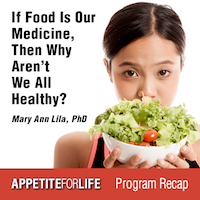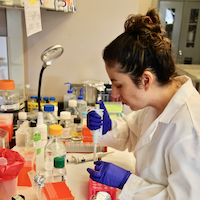Environment and Nutrition
Beginning at conception, environmental factors in health can accumulate over a lifetime and be from sources as broad as geographic location and economic status to specific external sources including physical activity, occupation, risky behaviors and diet. But some of these factors, especially in terms of diet are highly modifiable.
Important research is now being conducted on this concept of the “exposome,” as an environmental complement to the human genome. NRI researchers are learning how diet and other environmental exposures interact with disease and affect responses to treatment.
Publications
Environment and Nutrition Publications
2020
Precision (Personalized) Nutrition: Understanding Metabolic Heterogeneity. Zeisel S
Perspective: Dietary Biomarkers of Intake and Exposure-Exploration with Omics Approaches. Zeisel S
2019
Obesity and Cancer Metabolism: A Perspective on Interacting Tumor-Intrinsic and Extrinsic Factors. Hursting S
When less may be more: calorie restriction and response to cancer therapy. Hursting S
Energy balance and obesity: what are the main drivers? Hursting S
Metabolic Reprogramming by Folate Restriction Leads to a Less Aggressive Cancer Phenotype. Krupenko S
Early-Life Predictors of Fetal Alcohol Spectrum Disorders. May P
Alcohol’s Dysregulation of Maternal-Fetal IL-6 and p-STAT3 Is a Function of Maternal Iron Status. Smith S
2018
Energy balance and gastrointestinal cancer: risk, interventions, outcomes and mechanisms. Hursting S
Research Strategies for Nutritional and Physical Activity Epidemiology and Cancer Prevention. Hursting S
2017
Metabolic Reprogramming by Folate Restriction Leads to a Less Aggressive Cancer Phenotype. Krupenko S
Contribution of Dietary Supplements to Nutritional Adequacy in Various Adult Age Groups. Zeisel S
2016
CerS6 Is a Novel Transcriptional Target of p53 Protein Activated by Non-genotoxic Stress. Krupenko N
Abnormal Eating Behaviors Are Common in Children with Fetal Alcohol Spectrum Disorder. Smith S
Impact of a western diet on the ovarian and serum metabolome. Sumner S
Metabolomics enables precision medicine: “A White Paper, Community Perspective”. Sumner S
Related News
If Food Is Our Medicine, Why Aren’t We All Healthy?
February 25, 2019 – If you missed February’s Appetite for Life presentation by Mary Ann Lila, PhD, you can catch up. Watch the entire program on video now. The live presentation took place at Forty-Six in Kannapolis on Tuesday, February 12, 2019.
February Faculty Focus: Carol L. Cheatham, PhD
February 11, 2019 – That Carol L. Cheatham, PhD was a scientist was clear to her family early on. At the age of 8 growing up on a farm in rural Wyoming, Cheatham conducted observational studies following the many farm cats around to find out (and diligently record in her notebook) where they would give birth. Once that got boring, she started trying to predict where the litters would be born based on her observations from the previous years.
Celebrating and Preparing in A Milestone Year
January 25, 2019 – As we at the NRI celebrate our tenth anniversary year, we are also taking measures to secure our longevity. Our world-class research facility on the North Carolina Research Campus opened in 2008 with the most advanced equipment, instrumentation, and laboratories available. Now, as we enter a second decade, administrators are evaluating our building, systems, and staffing to ensure that our scientists have the best infrastructure to allow them to continue their quest for new precision nutrition discoveries.
June 2019
The DNA Diet: Knowing How Your Genes Can Help You Fit Into Your Jeans May 20, 2019 – How are we expected to make healthy choices about food when the headlines are so confusing? We all suffer whiplash when we read butter is bad, then butter is good; when red meat is...
The Choices I.C.A.N. Make
January 25, 2019 – Pregnant women are often consumed by dietary choices such as finding a great prenatal vitamin, eating foods that will promote fetal growth, and doing everything they can to protect their pregnancy. After delivery, however, the mother’s preoccupation with her diet often pauses for four to six months. The Cheatham Nutrition & Cognition Lab is turning this type of thinking on its head with the belief that what women eat while breastfeeding greatly impacts their breastmilk and ultimately, their children’s development.
January Faculty Focus: Philip May, PhD
January 11, 2019 – “I’ve been called ‘tenacious’,” says Philip A. May, PhD, with a hint of humor. It’s an understatement for the man who relentlessly pursues data that shed light on important public health issues across the United States and around the globe. May, professor of nutrition at the UNC Nutrition Research Institute (NRI) and in the Department of Nutrition at the Gillings School of Global Public Health at UNC-Chapel Hill, has been a demographer and epidemiologist for the better part of 50 years. He calls his style of research “shoe-leather” epidemiology, meaning that he gathers information for studies by getting out in the field and immersing himself in communities to really know the people in his studies. For nearly 30 of those years, May’s focus has been on learning about the often-dire effects and alarmingly high prevalence of fetal alcohol exposure.






